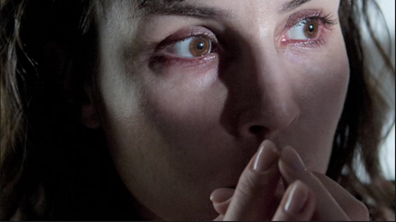"DE PALMA'S BLACK COMEDY RE-PHRASES GODARD:
'TO LIVE IN SOCIETY TODAY IS LIKE LIVING IN A DIGITAL HALL OF MIRRORS'"
 Noting that "Brian De Palma and Noah Baumbach have become thick as thieves," The Village Voice's Nick Pinkerton reviews the two filmmakers' new films side-by-side. "While De Palma's black comedy re-phrases Godard's 'To live in society today is like living in one enormous comic-strip' to a contemporary 'To live in society today is like living in a digital hall-of-mirrors'," writes Pinkerton, "Frances Ha is blown along by the French New Wave's gentler spirits." Pinkerton playfully toys with an attempt to link the two filmmakers' works together, at one point writing of Frances Ha that "Frances repeatedly describes Sophie and herself as 'the same person'--Identical twins? A hidden thematic link between De Palma and Baumbach?"
Noting that "Brian De Palma and Noah Baumbach have become thick as thieves," The Village Voice's Nick Pinkerton reviews the two filmmakers' new films side-by-side. "While De Palma's black comedy re-phrases Godard's 'To live in society today is like living in one enormous comic-strip' to a contemporary 'To live in society today is like living in a digital hall-of-mirrors'," writes Pinkerton, "Frances Ha is blown along by the French New Wave's gentler spirits." Pinkerton playfully toys with an attempt to link the two filmmakers' works together, at one point writing of Frances Ha that "Frances repeatedly describes Sophie and herself as 'the same person'--Identical twins? A hidden thematic link between De Palma and Baumbach?"Aside from all that, for Pinkerton, the "Ass cam" commercial in De Palma's film is "the perfect gag for a film about watching your back. The premise comes from an actual Levi's campaign, and it's the sort of Candid Camera scopophilia that has always been peekaboo De Palma's stock-in-trade, updated in Passion to a 21st century world whose inhabitants live in public in transparent corporate-park glass boxes, where personalities are infinitely fractured and refracted through ubiquitous image capture (smartphone sex tapes, security cameras, Skype conference), the weapons of choice in this three-way dual."
Pinkerton continues, "The color-coded casting--McAdams is blonde, Rapace brunette, Herfurth a redhead--has nothing to do with the director's positioning the women as symbolic placeholders representing various aspects of femininity. They're not merely passive subjects. De Palma respects his heroines as equal participants in his masquerade, colleagues in the field of image-making--McAdams at one point appears with the 'Image' of a Koch Image sign iconographically situated behind her--working towards hidden objectives from under cover of their archetypal roles, less clearly-delineated personalities than stand-in avatars representing themselves in a real-world that is ever more dissonantly virtual, their every interaction offering multivalent readings.
"McAdams, for example, does a fine (faux-?) heart-to-heart with Rapace, crying (crocodile?) tears over the girlhood death of a twin sister, a scene whose almost parodic pathos confounds comfortable response--as does Passion. Like most De Palma, it works perfectly well as slinky 'fun trash'--all the while throwing off infinitely more ideas per minute than works which present themselves to the public under the cumbersome mantle of art."
(Regarding the "trash" aesthetic, note De Palma's comment to MUBI's Daniel Kasman: "That's what I also don't like, when they say 'shoddy' and 'trashy,' when we try to make these people look as gloriously beautiful as we can. I keep wondering, 'What are you watching? Are you watching the screen?'”)
An image from Frances Ha:




